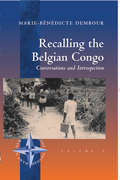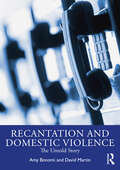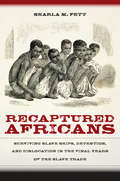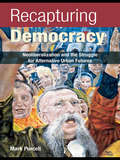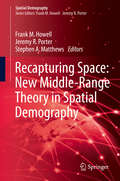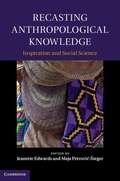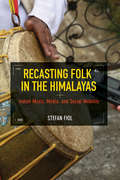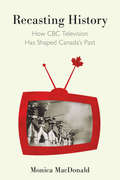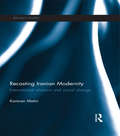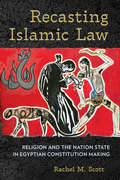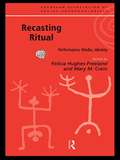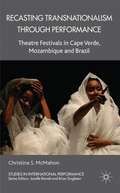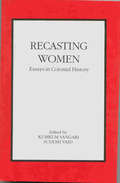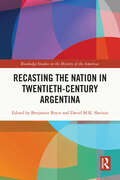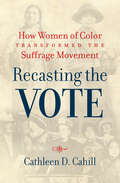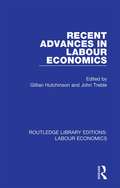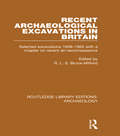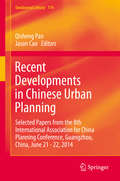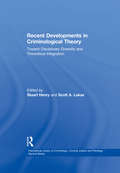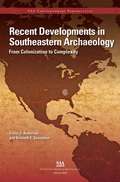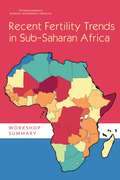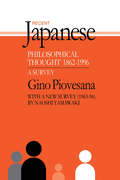- Table View
- List View
Recalling The Belgian Congo: Conversations and Introspection (New Directions in Anthropology #9)
by Marie-Benedicte DembourWhen the author embarked on her study, her aim was to approach former colonial officers with a view to analyzing processes of domination in the ex-Belgian Congo. However, after establishing a rapport with some of these officers, the author was soon forced to revise her initial assumptions, widely held in present-day Belgium: these officers were not the "baddies" she had expected to meet. Exploring the colonial experience through the respondents' memories resulted in a far more complex picture of the colonial situation than she had anticipated, again forcing her to question her original assumptions. This resulted not only in a more differentiated perspective on Belgian colonialist rule, but is also sensitized her as regards the question of anthropological understanding and of what constitutes historical fact. These two aspects of her work are reflected in this study that offers specific material on the way Belgian colonialism is remembered and reflects on its conditions of production, thus combining ethnographic analysis with a theoretical essay.
Recantation and Domestic Violence: The Untold Story
by David Martin Amy BonomiRecantation and Domestic Violence empowers people and communities in improving their understanding of and skills in domestic violence cases that involve recantation. This book illustrates the precise interpersonal dynamics of recantation in criminal cases in which felony-level abuse has occurred. This book equips professionals in working more effectively with victims of domestic violence, their abusers, family members, and other supporters. Using the five-stage model of recantation, case examples, and audiotaped telephone conversations between abusers and their victims, it puts the reader directly in touch with what abusers say, how they say it, and how victims respond. This book is applicable to practitioners and research audiences in fields such as criminal law, family law, child custody, violence prevention, therapeutic interventions, medicine, nursing, psychology, social work, sociology, and behavioral economics.
Recapitulations
by Vincent CrapanzanoA distinguished anthropologist tells his life story as a wistful novelist would, watching himself as if he were someone elseThis memoir recaptures meaningful moments from the author's life: as his childhood on the grounds of a psychiatric hospital, his psychiatrist father's early death, his years at school in Switzerland and then at Harvard in the 1960s, his love affairs, his own teaching, and his far-flung travels. Taken together, these stories have the power of a nothing-taken-for-granted vision, fighting those conventions and ideologies that deaden the creative and inquiring mind.
Recaptured Africans: Surviving Slave Ships, Detention, and Dislocation in the Final Years of the Slave Trade
by Sharla M. FettIn the years just before the Civil War, during the most intensive phase of American slave-trade suppression, the U.S. Navy seized roughly 2,000 enslaved Africans from illegal slave ships and brought them into temporary camps at Key West and Charleston. In this study, Sharla Fett reconstructs the social world of these "recaptives" and recounts the relationships they built to survive the holds of slave ships, American detention camps, and, ultimately, a second transatlantic voyage to Liberia. Fett also demonstrates how the presence of slave-trade refugees in southern ports accelerated heated arguments between divergent antebellum political movements--from abolitionist human rights campaigns to slave-trade revivalism--that used recaptives to support their claims about slavery, slave trading, and race.By focusing on shipmate relations rather than naval exploits or legal trials, and by analyzing the experiences of both children and adults of varying African origins, Fett provides the first history of U.S. slave-trade suppression centered on recaptive Africans themselves. In so doing, she examines the state of "recaptivity" as a distinctive variant of slave-trade captivity and situates the recaptives' story within the broader diaspora of "Liberated Africans" throughout the Atlantic world.
Recapturing Democracy: Neoliberalization and the Struggle for Alternative Urban Futures
by Mark PurcellRecapturing Democracy is a short yet synoptic introduction to urban democracy in our era of political neoliberalism and economic globalization. Combining an original argument with a number of case studies, Mark Purcell explores the condition of democracy in contemporary Western cities. Whereas many scholars focus on what Purcell calls "procedural democracy" – i.e., electoral politics and access to it – he instead assesses "substantive democracy." By this he means the people’s ability to have some say over issues of social justice, material well being, and economic equality. Neoliberalism, which advocates a diminished role for the state and increasing power for mobile capital, has diminished substantive democracy in recent times, he argues. He looks at case studies where this has occurred and at others that show how neoliberalism can be resisted in the name of substantive democracy. Ultimately, he utilizes Henri Lefebvre’s notion of "the right to the city," which encompasses substantive as well as procedural democracy for ordinary urban citizens.
Recapturing Space: New Middle-Range Theory in Spatial Demography
by Stephen A. Matthews Frank M. Howell Jeremy R. PorterWith a unique focus on middle-range theory, this book details the application of spatial analysis to demographic research as a way of integrating and better understanding the different transitional components of the overall demographic transition. This book first details key concepts and measures in modern spatial demography and shows how they can be applied to middle-range theory to better understand people, places, communities and relationships throughout the world. Next, it shows middle-range theory in practice, from using spatial data as a proxy for social science statistics to examining the effect of "fracking" in Pennsylvania on the formation of new coalitions among environmental advocacy organizations. The book also traces future developments and offers some potential solutions to promoting and facilitating instruction in spatial demography. This volume is an ideal resource for advanced undergraduate and graduate students enrolled in courses involving spatial analyses in the social sciences, from sociology and political science to economics and educational research. In addition, scholars and others interested in the role that geographic context plays in relation to their research will find this book a helpful guide in further developing their work.
Recasting Anthropological Knowledge
by Maja Petrović-Šteger Jeanette EdwardsThis collection of original essays provides an innovative and multifaceted reflection on the impact and inspiration of the scholarship of eminent anthropologist Marilyn Strathern. A distinguished team of international contributors, all former students of Strathern, reflect on the impact of their relationship with their teacher and address the wider conceptual contribution of her work through their own writings. The essays provide an accessible entry into Strathern's scholarship for those new to her work and a rich source of material which mobilises and deploys her concepts, including new ethnographic examples and discussion of contemporary political issues, for those more familiar with her scholarship. The result is a collection that dissects, contextualises and reroutes concepts of relationality, inspiration and knowledge in novel and unpredictable ways. Recasting Anthropological Knowledge will prove invaluable to all students of anthropology and will be of interest to scholars across the social sciences.
Recasting Folk in the Himalayas: Indian Music, Media, and Social Mobility (The Folklore Studies in a Multicultural World)
by Stefan FiolColonialist, nationalist, and regionalist ideologies have profoundly influenced folk music and related musical practices among the Garhwali and Kumaoni of Uttarakhand. Stefan Fiol blends historical and ethnographic approaches to unlock these influences and explore a paradox: how the œfolk designation can alternately identify a universal stage of humanity, or denote alterity and subordination. Fiol explores the lives and work of Gahrwali artists who produce folk music. These musicians create art as both a discursive idea and as a set of expressive practices across strikingly different historical and cultural settings. Juxtaposing performance contexts in Himalayan villages with Delhi recording studios, Fiol shows how the practices have emerged within and between sites of contrasting values and expectations. Throughout, Fiol presents the varying perspectives and complex lives of the upper-caste, upper-class, male performers spearheading the processes of folklorization. But he also charts their resonance with, and collision against, the perspectives of the women and hereditary musicians most affected by the processes. Expertly observed, Recasting Folk in the Himalayas offers an engaging immersion in a little-studied musical milieu.
Recasting History: How CBC Television Has Shaped Canada's Past
by Monica MacDonaldSince 1952, CBC television has played a unique role as the primary mass media purveyor of Canadian history. Yet until now, there have been no comprehensive accounts of Canadian history on television. Monica MacDonald takes us behind the scenes of the major documentaries and docudramas broadcast on the CBC, including in Explorations (1956–64) and the series Images of Canada (1972–76), The National Dream (1974), The Valour and the Horror (1992), and Canada: A People's History (2000–02). Drawing on a wide range of sources, MacDonald explores how producers struggled to represent the Canadian past under a range of external and internal pressures. Despite dramatic shifts in the writing of history over this period, she determines that television themes and interpretations largely remained the same. The greater change was in the production and presentation, particularly in the role of professional historians, as journalists emerged not only as the new producers of Canadian history on CBC television, but also as the new content authorities. A critique of public history through the lens of political economy, Recasting History reveals the conflicts, compromises, and controversies that have shaped the CBC version of the Canadian past.
Recasting Iranian Modernity: International Relations and Social Change (Iranian Studies)
by Kamran MatinCritically deploying the idea of uneven and combined development this book provides a novel non-Eurocentric account of Iran’s experience of modernity and revolution. Recasting Iranian Modernity presents the argument that Eurocentrism can be decisively overcome through a social theory that has international relations at its ontological core. This will enable a conception of history in which there is an intrinsic international dimension to social change that prevents historical repetition. This hitherto under-theorized international dimension is, the book argues, manifest in combined patterns of development, which incorporate both foreign and native forms. It is the tension-prone and unstable nature of these hybrid developmental patterns that mark Iranian modernity, and fuelled the socio-political dynamics of the 1979 revolution and the rise of political Islam. Challenging solely comparative approaches to the Iranian Revolution that explain it away as either a deviation from, or a reaction to, modernity on the grounds of its religious form, this book will be valuable to those interested in an alternative theoretical approach to the Iranian Revolution, modern Iran and political Islam, working in the fields of International Relations, Middle East and Islamic Studies, History, Political Science, Political Sociology, Postcolonialism, and Comparative Politics.
Recasting Islamic Law: Religion and the Nation State in Egyptian Constitution Making
by Rachel M. ScottBy examining the intersection of Islamic law, state law, religion, and culture in the Egyptian nation-building process, Recasting Islamic Law highlights how the sharia, when attached to constitutional commitments, is reshaped into modern Islamic state law.Rachel M. Scott analyzes the complex effects of constitutional commitments to the sharia in the wake of the Egyptian Revolution of 2011. She argues that the sharia is not dismantled by the modern state when it is applied as modern Islamic state law, but rather recast in its service. In showing the particular forms that the sharia takes when it is applied as modern Islamic state law, Scott pushes back against assumptions that introductions of the sharia into modern state law result in either the revival of medieval Islam or in its complete transformation. Scott engages with premodern law and with the Ottoman legal legacy on topics concerning Egypt's Coptic community, women's rights, personal status law, and the relationship between religious scholars and the Supreme Constitutional Court. Recasting Islamic Law considers modern Islamic state law's discontinuities and its continuities with premodern sharia.
Recasting Ritual: Performance, Media, Identity (European Association of Social Anthropologists)
by Felicia Hughes-Freeland Mary M. CrainRecasting Ritual explores how ritualized action diversifies in response to varying cultural, political and physical contexts. The contributors look at how issues such as globalisation and technology affect ritual performance and how minorities often utilise performances to affirm their own identites while also speaking to outsiders.The contributors examine the relationship between ritual meaning and social identity through case-studies drawn from the Pacific, Scandinavia, the Mediterranean, Latin America, Indonesia, and East and West Africa. Study of the theoretical underpinnings of social action affirms the independence of anthropology as a discipline from cultural, media and performance studies, according it a distinctive role in elucidating contemporary and emergent human conditions.
Recasting Transnationalism through Performance
by Christina S. McmahonThe past two decades have witnessed the emergence of a lively Portuguese-language theatre festival circuit, where Brazilian, Portuguese, and Lusophone African artists come together and jointly negotiate the cultural dynamics of an emerging transnational community grounded in a common language and shared colonial histories. Christina S. McMahon trains a sharp ethnographic eye on African performances staged at these festivals, revealing how festival productions and their aftermath can generate new perspectives on race and gender, colonial trauma, and the economics of cultural globalization. Featuring in-depth analysis of performances and artist interviews from Cape Verde, Angola, Guinea-Bissau, and Mozambique countries with vibrant theatre practices and vexed colonial pasts the book reveals how international festivals can be valuable platforms for new intercultural dialogues and diplomatic possibilities. Recasting Transnationalism through Performance offers a fresh look at the role of theatre in navigating new postcolonial realities. "
Recasting Women: Essays in Colonial History
by Edited by Kumkum Sangari Sudesh VaidIn this landmark collection on colonial history, Kumkum Sangari and Sudesh Vaid bring together some of India's leading historians and feminist theorist to examine the impact of patriarchy on women's daily lives during the colonial period, specifically in relation to caste and class. From the abolition of sati to popular culture of 19th century Bengal; from the 'ideals' of womanhood contained in Vedic texts to the Telangana People's Struggle in Hyderabad in the late 1940s and 50s; what emerges in each of the essays is how, as Uma Chakravarti puts it, 'the past itself [is] a creation of the compulsions of the present'.
Recasting the Social in Citizenship
by Engin F. IsinPrevious notions of what constitutes "citizenship" within a country have been steadily challenged by the movement towards a globalized world. Examining the everyday habits of citizens and non-citizens, the contributors to Recasting the Social in Citizenship show how citizenship has increasingly been determined by social behaviours rather than by civil or political affiliations. Broadening the debate by interpreting the social not only as rights and privileges, but also as everyday struggles, this volume offers studies that range from environmental and security issues to transnational migration and military transformations. It further discusses debates over multiculturalism and integration and takes a fresh look at how social activities such as eating, commuting, smoking, as well as sexual habits of citizens and non-citizens have become increasingly governed by the state. Tracing developments in politics and social actions that have bound together citizens and non-citizens, Engin F. Isin and the volume's contributors explore the social sites that have become objects of government, and considers how these subjects are sites of contestation, resistance, differentiation and identification. In doing so, they provide significant insights into the changing states of citizenship and social governance, making Recasting the Social in Citizenship an engaging collection that will be of interest to sociologists, political scientists, and anyone with a concern about immigration and citizenship.
Recasting the Nation in Twentieth-Century Argentina
by Benjamin Bryce Sheinin, David M. K.Recasting the Nation in Twentieth-Century Argentina tackles the meaning of "the nation" by looking to the geographical, ideological, and political peripheries of society. What it means to be Argentine has long consumed writers, political leaders, and many others. For almost two centuries prominent figures have defined national values while looking out from the urban centers of the country, and above all Buenos Aires. They have described the nation in terms of urban experience and, secondarily, by surrounding frontiers; they have focused on the country’s European heritage and advanced an entangled vision of race and space. The chapters in this book take a dynamic new approach. While scholars and political leaders have routinely ignored the country’s many peripheries, the Argentine nation cannot be reasonably understood without them. Those on the margins also defined core tenets of the nation. This volume will be vital reading for those interested in how Latin American societies emerged over the past two centuries, and for those curious about how ideas outside of the mainstream come to define national identities.
Recasting the Vote: How Women of Color Transformed the Suffrage Movement
by Cathleen D. CahillWe think we know the story of women's suffrage in the United States: women met at Seneca Falls, marched in Washington, D.C., and demanded the vote until they won it with the ratification of the Nineteenth Amendment. But the fight for women's voting rights extended far beyond these familiar scenes. From social clubs in New York's Chinatown to conferences for Native American rights, and in African American newspapers and pamphlets demanding equality for Spanish-speaking New Mexicans, a diverse cadre of extraordinary women struggled to build a movement that would truly include all women, regardless of race or national origin. In Recasting the Vote, Cathleen D. Cahill tells the powerful stories of a multiracial group of activists who propelled the national suffrage movement toward a more inclusive vision of equal rights. Cahill reveals a new cast of heroines largely ignored in earlier suffrage histories: Marie Louise Bottineau Baldwin, Gertrude Simmons Bonnin (Zitkala-Ša), Laura Cornelius Kellogg, Carrie Williams Clifford, Mabel Ping-Hua Lee, and Adelina "Nina" Luna Otero-Warren. With these feminists of color in the foreground, Cahill recasts the suffrage movement as an unfinished struggle that extended beyond the ratification of the Nineteenth Amendment. As we celebrate the centennial of a great triumph for the women's movement, Cahill's powerful history reminds us of the work that remains.
Recent Advances in Labour Economics (Routledge Library Editions: Labour Economics #9)
by John Treble Gillian HutchinsonFirst published in 1984. This book presents a great deal of research findings, new advances in theory and comprehensive overviews of key aspects of labour economics. It examines the latest trends in the field and assesses the impact of recent policies together with the likely impact of proposed policies. This study covers a wide range of topics but concentrates in particular on questions connected with the economics of trade unions which is a major area of concern for labour economists.
Recent Archaeological Excavations in Britain: Selected Excavations, 1939-1955 (Routledge Library Editions: Archaeology)
by R. L. S. BRUCE-MITFORDOriginally published in 1956, this collection features chapters by well-known archaeologists on various archaeological sites explored in the previous decade, as examples of the techniques being used and finds being made. Mostly from the lowland zone of Britain, the chapters nonetheless offer a spread of location and site types; while the periods being investigated range from prehistoric to Romano-British to later fields. This detailed work exemplifies the steady progress of study in archaeology and a final chapter on air reconnaissance deals with one of the most revolutionary additions to archaeology in the post-war period. Contributors include: J.G.D. Clark, R. Rainbird Clarke, Sir Mortimer Wheeler, I.A. Richmond, G.W. Meates, W.F. Grimes, C.W. Phillips, J.R.C. Hamilton, Brian Hope-Taylor, J.G. Hurst, J.K.S. St. Joseph.
Recent Developments in Chinese Urban Planning: Selected Papers from the 8th International Association for China Planning Conference, Guangzhou, China, June 21 - 22, 2014 (GeoJournal Library #114)
by Qisheng Pan Jason CaoThis book provides a comprehensive overview of the most recent development of Chinese cities. It discusses a broad range of subjects of urban planning, including environmental planning, transportation planning, historical preservation, economic development, geographic information systems (GIS) and other technological applications. China, the most populous country in the world, has experienced unprecedented urbanization in a relatively short period. During the past decades, urbanization in China has centered on land development through industrialization and investment, but it has largely ignored the prosperity and well-being of the people. Livable cities are not just those with magnificent buildings and infrastructure; they are great places where people want to live. China’s recently inaugurated leaders have proposed a new model to actively and prudently enhance the quality of urbanization through compact, intelligent, and low-carbon development. It symbolizes the departure from land-centered urban development to a form of people-oriented urbanization, as China’s Premier, Li Keqiang, has advocated. This new model offers a platform for planning researchers and practitioners to tackle urbanization challenges, such as social equity, environment, energy, ecological and historic preservation, affordable housing, and externalities of mega cities. Furthermore, people-oriented urbanization calls for public participation and stakeholder engagement in the planning process. This book brings together planners, designers, scholars, scientists, and government officials from China and all over the world to exchange ideas on urban regeneration.
Recent Developments in Criminological Theory: Toward Disciplinary Diversity and Theoretical Integration (International Library Of Criminology, Criminal Justice And Penology - Second Ser. #Vol. 2)
by Stuart Henry Scott A. LukasThis volume contains recent and cutting-edge articles from leading criminological theorists. The book is organized into ten sections, each representing the latest in the multi-disciplinary orientations representing a cross-section of contemporary criminological theory. These sections include: 1: Classical and Rational Choice; 2: Biological and Biosocial; 3: Psychological; 4: Social Learning and Neutralization; 5: Social Control; 6: Social Ecology, Sub-cultural and Cultural; 7: Anomie and Strain; 8: Conflict and Radical; 9: Feminist and Gender; 10: Critical Criminologies: Anarchist, Postmodernist, Peacemaking. The articles were selected based on their contributions to advancing the field, including ways in which the authors of each chapter understand the current theoretical tendencies of their respective approaches and how they envision the future of their theories. Because of this, the articles focus on theory rather than empirical research. Of particular note is the tendency toward integration of different perspectives, as described by editors, Henry and Lukas, in their original introduction to this volume.
Recent Developments in Southeastern Archaeology: From Colonization to Complexity
by David G. Anderson Kenneth E. SassamanRecent Developments in Southeastern Archaeology: From Colonization to Complexity
Recent Developments in Southeastern Archaeology: From Colonization to Complexity (SAA Current Perspectives)
by David G. Anderson Kenneth E. SassamanThis book in the SAA Press Current Perspectives Series represents a period-by-period synthesis of southeastern prehistory designed for high school and college students, avocational archaeologists, and interested members of the general public. It also serves as a basic reference for professional archaeologists worldwide on the record of a remarkable region.
Recent Fertility Trends in Sub-Saharan Africa: Workshop Summary
by Engineering Medicine National Academies of SciencesFertility rates and population growth influence economic development. The marked declines in fertility seen in some developing nations have been accompanied by slowing population growth, which in turn provided a window of opportunity for rapid economic growth. For many sub-Saharan African nations, this window has not yet opened because fertility rates have not declined as rapidly there as elsewhere. Fertility rates in many sub-Saharan African countries are high: the total rate for the region is estimated to be 5.1 births per woman, and rates that had begun to decline in many countries in the region have stalled. High rates of fertility in these countries are likely to contribute to continued rapid population growth: the United Nations projects that the region's population will increase by 1.2 billion by 2050, the highest growth among the regions for which there are projections. In June 2015, the Committee on Population organized a workshop to explore fertility trends and the factors that have influenced them. The workshop committee was asked to explore history and trends related to fertility, proximate determinants and other influences, the status and impact of family planning programs, and prospects for further reducing fertility rates. This study will help donors, researchers, and policy makers better understand the factors that may explain the slow pace of fertility decline in this region, and develop methods to improve family planning in sub-Saharan Africa.
Recent Japanese Philosophical Thought 1862-1994: A Survey
by Gino K. PiovesanaPiovesana's famous survey is republished with an additional chapter by Naoshi Yamawaki to cover the intervening years up to 1994. It continues to be the only introduction to Japanese thinkers and philosophical thought covering the period of Japan's 'modern' era.
